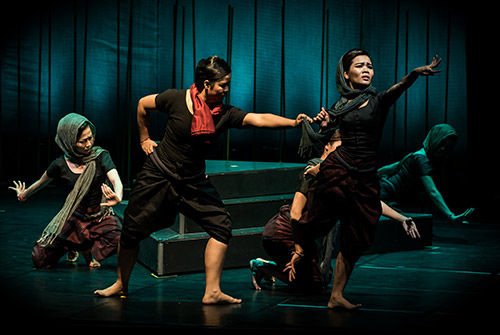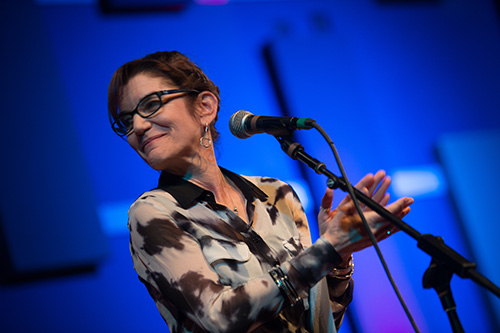This commentary was contributed by Hub member Toni Shapiro-Phim, associate professor of Creativity, the Arts, and Social Transformation, Brandeis University.
Toni Shapiro-Phim
A “moral and collective reparation” project associated with the Extraordinary Chambers in the Courts of Cambodia (ECCC) — also known as the Khmer Rouge Tribunal — offers an example of the potency of expressive culture in truth-telling. It also demonstrates how innovation within time-honored tradition might nurture empathy for survivors of mass violence and contribute to the expansion and preservation of the historical record, while also encouraging discussion and strategizing about ways to address contemporary (in this case, gender-based) violence. Phka Sla Kraom Angkar, an initiative involving the commission and performance of a dance-drama based on testimonies of survivors of the Khmer Rouge’s practice of “forced marriage” — along with a mobile exhibition, multigenerational dialogues, documentaries, oral histories, psychological support and research — premiered in 2017.
The ECCC was specially constituted to try Khmer Rouge leaders for crimes against humanity and genocide, and it brings together judges and law from both Cambodian and international spheres. Becoming fully operational in 2007, this hybrid court’s jurisdiction has covered only senior leaders and those deemed to have been most responsible for the crimes perpetrated during the time of Khmer Rouge rule (when the country was known as Democratic Kampuchea), from mid-April 1975 to early January 1979. A groundbreaking element of the ECCC is its inclusion of “civil parties,” granting victims the status of a legal party to the proceedings. As such, civil parties have had the right to request “moral and collective reparation,” reparation that acknowledges the harm suffered and contributes to the mitigation of that harm, restores some sense of survivors’ dignity and maintains collective memory.
In April 2014, Khieu Samphan (former head of state) and Nuon Chea (former deputy secretary of the Communist Party of Kampuchea and chairman of Democratic Kampuchea’s People’s Assembly) were charged with, among other things, genocide against the Cham and Vietnamese and crimes against humanity, including a forced marriage practice (one that amounted to institutionalized rape) inflicted on the population. (Both men had earlier been convicted of additional crimes against humanity.) The trial ended in 2017 and, in November 2018, the Court announced its findings: both men were found guilty and, again, sentenced to life imprisonment.
Although reparations are only awarded following a conviction of the accused, reparations requests are developed and submitted prior to the conclusion of the case trial. The Victim Support Service, an official section of the ECCC, has a mandate to “identify, design, and implement reparation projects; and to seek external funding and support.” Phka Sla Kraom Ankgar, a project of multiple nongovernmental organizations in collaboration with survivors of “forced marriage,” was initially proposed in 2016.
 Phka Sla. Photo: Nobuyuki Arai.
Phka Sla. Photo: Nobuyuki Arai.
I introduce the dance-drama, Phka Sla, in the March 2020 special issue of the International Journal of Transitional Justice, which is devoted to creative approaches to transitional justice. Believing it essential to include the experiences and perspectives of those who interpret victim stories/testimonies when exploring the aftermath of mass violence, my focus during this initial research phase has been on the choreographer, dancers and musicians who took on the agony and brutality of others, not only as they were creating the dance-drama but also each time they performed it.
